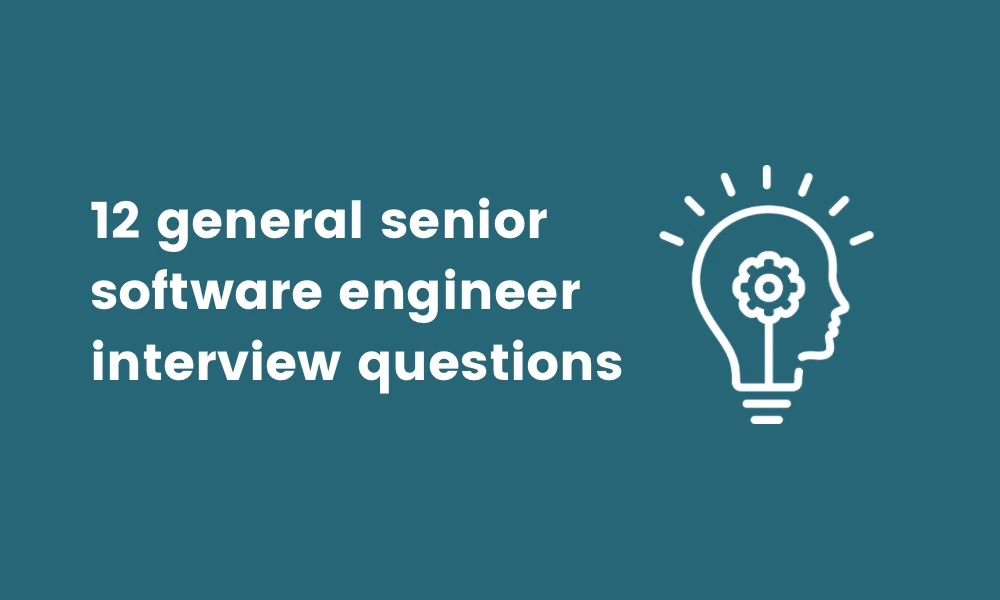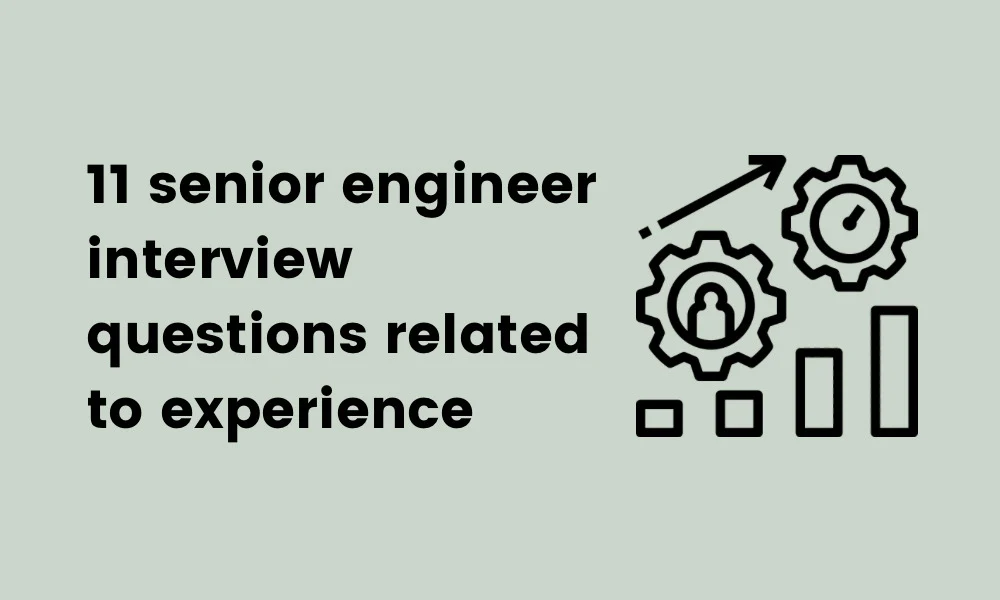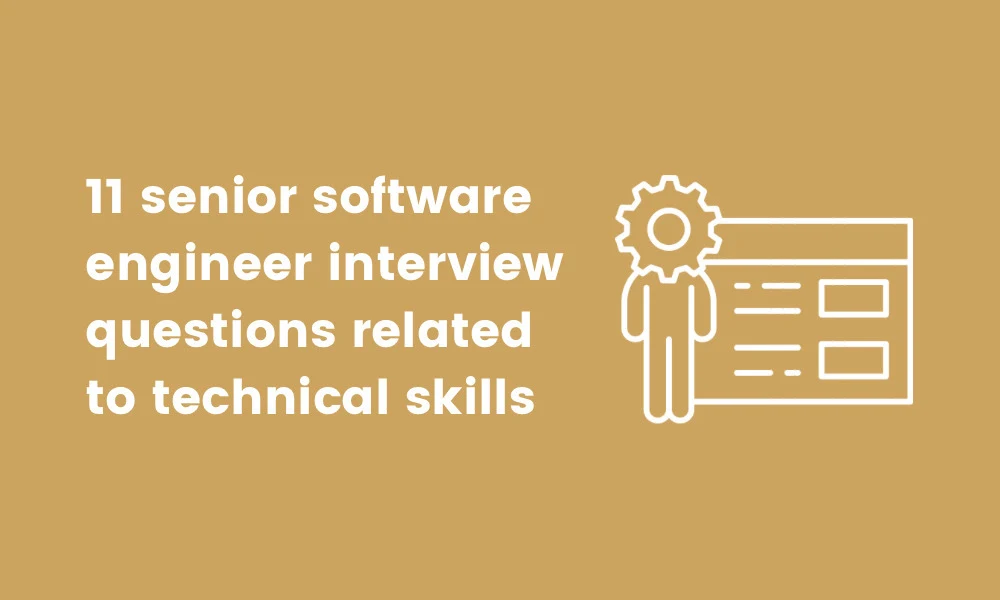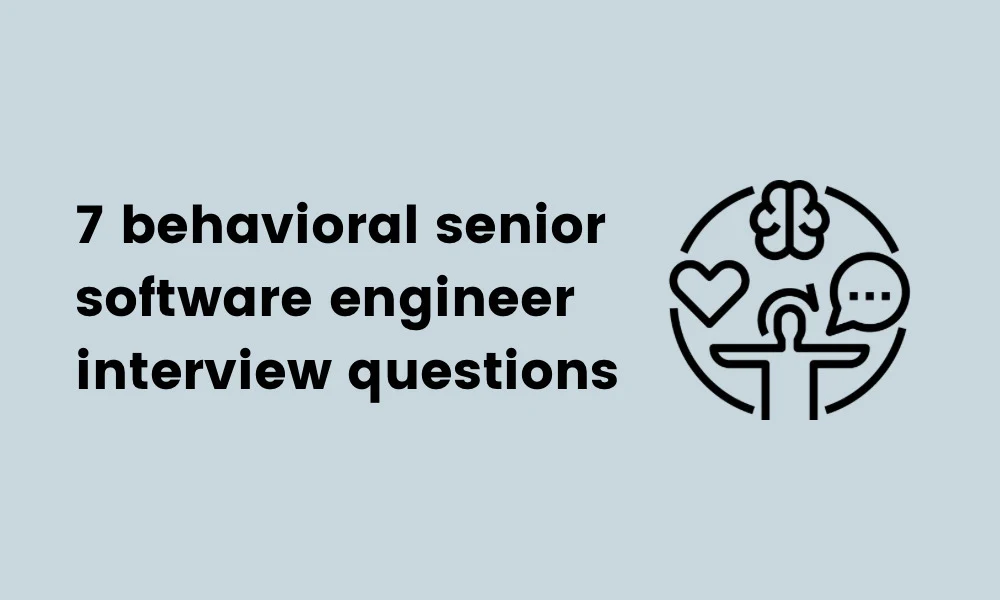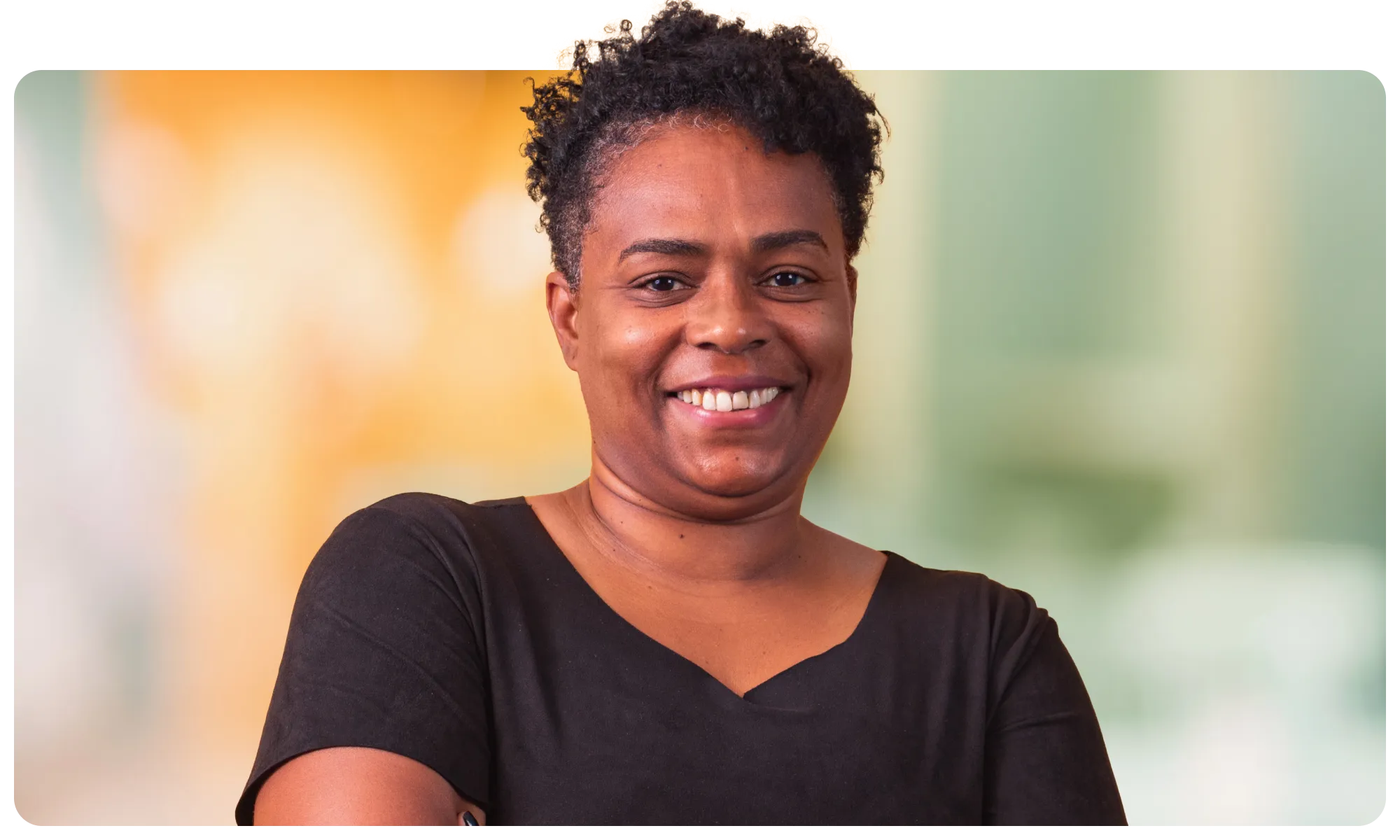Are you hiring a senior software engineer for your organization?
You probably already know that a senior software engineer must have full-stack knowledge, business acumen, and exceptional interpersonal skills to excel in the role.
They must also have strong programming and software skills, and a solid knowledge of the different frameworks and development tools. But the question is, how can you tell if your candidates have these skills?
A skills assessment should be your priority since it can help you avoid bias and filter out candidates who lack the skills you need. After this, the interview stage can be incredibly insightful.
In this article, you’ll find senior software engineer interview questions that you need for the interview stage.
Table of contents
- 12 general senior software engineer interview questions
- Sample answers to five key general senior software engineer interview questions
- 11 senior engineer interview questions related to experience
- Sample answers to the five of the most crucial experience-related interview questions for senior software engineers
- 11 senior software engineer interview questions related to technical skills
- Sample answers to five vital technical senior software engineer interview questions
- 7 behavioral senior software engineer interview questions
- Sample answers to five essential behavioral senior software engineer interview questions
- 5 tips to consider before asking candidates senior software interview questions
- Compile a list of senior software engineer interview questions to hire the best talent
12 general senior software engineer interview questions
This first set of 12 senior software engineer interview questions will help you learn more about your candidates’ general skills, attitude, personalities and whether they fit your organization’s culture.
How familiar are you with our organization’s products and services?
Which specific software engineering trends interest you the most?
What is your strategy for setting and achieving goals in a professional environment?
Do you contribute to open-source projects? Could you give some examples?
Which experiences have helped you enhance your skills in senior software engineering?
What would you say are your software engineering strengths?
What is your strategy for remaining knowledgeable on the changing trends in software engineering?
What goals do you believe you can achieve within our organization?
What are your most vital leadership skills?
Which leadership skills do you need to enhance?
Which values are important to you in the context of software engineering?
What about the company or our team interests you the most?
Sample answers to five key general senior software engineer interview questions
Here are five of the most important general senior software engineer interview questions from the list above, along with tips on what to look for and the answers you can expect from exceptional candidates.
1. In what workplace environment do you prefer to work?
Senior software engineers should be capable of performing well in dynamic, fast-paced environments, so your candidates should be accustomed to this. Stand-out answers will describe a situation in which your candidates have performed well under significant pressure.
Perhaps they had to use task prioritization to accomplish a big task within a tight deadline. Maybe your candidates can work well with collaborative teams, but are flexible enough to work independently, as well: There are situations where working independently with minimal guidance might be required.
Take note of candidates who can explain how they can collaborate with other engineers, perhaps in Scrum or DevOps teams.
2. What would you say are your software engineering strengths?
There are a few critical strengths that promising candidates might outline in response to this question.
At this level of seniority, candidates must be comfortable collaborating with junior and mid-level engineers. They should be able to describe examples of how their collaboration has helped them accomplish a task.
Other vital strengths that your candidates might outline include:
Showing empathy and using this soft skill to complete projects with others
An in-depth understanding of frameworks and programming languages
The ability to implement stakeholders’ feedback into a project
3. What are your most vital leadership skills?
Senior software engineers are considered an integral part of a team and should have excellent leadership skills.
Your candidates might mention that they can work well within a team, but they should also give examples of their interpersonal skills in action.
They might show how their active listening skills and their capability of intrinsic validation have assisted them. Candidates may also demonstrate that they can use their communication skills to work on project tasks with junior software engineers and senior management.
They may also show that they are interested in the organization’s business side and that they proactively aim to learn more about the product or software that is being developed.
4. Which leadership skills do you need to enhance?
In response to this question, candidates must show that they are humble and aware that they may have skills they need to develop, but are working on this in their current role.
For instance, your candidates might not be comfortable with pitching new concepts or solutions to clients’ software requirements. They may struggle with interacting with cross-functional teams, such as marketing, sales, or support.
If so, they should demonstrate that they are actively taking steps to work on these skills. For instance, are they reading books on cross-functional team communication to solve this? Taking an online course? Or are they using new communication tools more frequently to develop these skills?
5. Which values are important to you for software engineering?
A senior software engineer might be able to show that their individual productivity is high. Still, some of the other factors they should value are the ability to provide mentorship and advice to other team members, to enhance teams’ productivity, and to assist their colleagues with specific projects.
Candidates might have many other values, including transparency, honesty, empathy, and trust-building. Take note of the candidates whose values align with those of your organization.
11 senior engineer interview questions related to experience
You can use the following 11 senior software engineer interview questions to learn more about your candidates’ past experiences.
What educational experiences (degrees, certifications) have helped you in your career, and how?
Can you outline any goals you achieved that have contributed to your career progression?
Have you completed any training programs recently? Would you be interested in extra training sessions?
Can you give an example of a time that you failed to finish a project on time? What did you learn from this experience?
How do you handle project management? Which steps do you use?
Do you have experience with managing project budgets? What is your approach for staying on budget?
What approach would you use to choose between two tools to execute a project?
Can you give an example of a time you needed to solve a conflict within your software engineering team? What approaches did you use to achieve this?
How big was your largest software engineering team? How did you communicate with the team to complete tasks?
How much time have you spent working in a senior engineer role?
How would you guide a junior developer or onboard a new team member?
Sample answers to the five of the most crucial experience-related interview questions for senior software engineers
Below, we’ve selected five of the most crucial experience-related software engineer interview questions and outlined the things you should look out for in the answers of your candidates.
1. How would you guide a junior developer or onboard a new team member?
Mentorship is a crucial part of any senior software engineering position. Candidates should show that they could assist a junior developer even through informal mentorship, and give you specific examples of how they’ve achieved this in the past.
Perhaps they conducted a series of code reviews. Maybe they were part of the onboarding process. They might have contributed to informal coffee chats and given junior developers useful career advice.
Or maybe they’re used to establishing regular meetings. Look for candidates who can explain you their methods of deciding on:
Crucial topics they need to discuss with the junior developer
The frequency/cadence of the meetings
Ways to contribute to progress development
Mentorship can help a senior developer grow within their role. Look out for candidates who mention specific skills that they’ve gained while mentoring others, such as:
Empathy
Communication
2. Can you give an example of a time you needed to solve a conflict within your software engineering team? What approaches did you use to achieve this?
Conflict often occurs when communication is not clear, and solid conflict resolution skills are essential to diffuse tense situations.
Senior software engineer candidates might cite examples where written communication has gone awry or where a code review has caused tension within the team and explain how they have stepped in to resolve this.
Perhaps they encouraged team members to jump on a video call and acted as an intermediary between them. They might have encouraged their team members to think with an open mind or request the input of other team members and ask them to weigh in.
3. How do you handle project management? Which steps do you use?
Efficient project management in software development involves a few different skills, such as the capacity to:
Communicate clearly with stakeholders
Keep them informed on the team’s progress
Provide accurate estimates for reaching each milestone
Exceptional time management skills are important here.
Candidates might also mention project management tools they use to handle projects, such as Jira, Asana, Trello, or Zoho Projects. If they aren’t familiar with the project management tools you use in your organization, they should explain how they’d learn them.
4. Can you name a time that you failed to finish a project on time? What did you learn from this experience?
In response to this question, candidates must show that they learned to manage tasks more efficiently despite missing a deadline or being unable to complete a milestone within the allotted time frame.
For example, they might be aiming to communicate more efficiently with their team members, managers, and stakeholders, or they may have implemented different internal and external deadlines to make sure the team stays on track.
It’s also essential that candidates show they can be honest and transparent in such cases. When communicating with team members and managers, they should accurately communicate the progress achieved on the project.
5. How big was your largest software engineering team? How did you communicate with the team to complete tasks?
For most candidates, their largest software engineering team would’ve likely had a maximum of seven members. Team sizes larger than seven are uncommon, especially in companies who use an Agile/Scrum framework: according to Scrum rules, communication can quickly become a challenge in bigger teams.
The ideal way to communicate with team members is to use active listening skills and ask questions to clarify potential issues. You might also hear your candidates mention that communication channels play a vital role and that being brief when communicating can help in some circumstances.
Senior software engineers must also know how to work with engineering managers to complete tasks and will typically have a one-on-one session each week to achieve this.
11 senior software engineer interview questions related to technical skills
The next eleven senior software interview questions will help you learn about your candidates’ technical skills and knowledge. Use them to find out whether their abilities align with the requirements of the role.
If you needed to debug a system of applications, how would you accomplish this?
Have you ever integrated an Agile framework into your engineering processes?
Describe a challenging project that you worked on in the past. Which approach did you use to complete it?
What is OOP? Can you explain why it’s important?
What approach do you use for organizing or arranging assets and class modules?
In which circumstances should NoSQL be used over SQL?
Explain what the software development life cycle is.
Can you explain what responsive design is?
Explain what fixed layouts are.
Explain what liquid layouts are.
What do you know about non-deterministic programming?
Sample answers to five vital technical senior software engineer interview questions
In this section, we’ve outlined the things you should look out for in your candidates’ answers to five of the most important interview questions above.
1. Explain what fixed layouts are.
Since senior software engineers and engineering teams will often work with front-end teams, candidates should know what fixed layouts are. A fixed layout, which might be considered the opposite of a liquid layout, is where the page’s width is set with a specific numerical value.
2. Explain what liquid layouts are.
Again, since software engineers will communicate back and forth with front-end teams on projects, they should understand this term. A liquid layout refers to a page with a flexible width, which changes depending on how wide the viewer’s browser is.
3. What do you know about non-deterministic programming?
Senior software engineers should understand non-deterministic programming and its relation to deterministic programming.
The two types of programming depend on nondeterministic and deterministic algorithms, respectively:
A deterministic algorithm will produce the same output going through the same states
Non-deterministic algorithms may produce different outputs in different runs
Non-deterministic algorithms can be slightly random in this sense.
4. Can you explain what responsive design is?
In the context of front-end design, this approach allows websites and pages to render on all devices and screen sizes. It means that the page will render automatically to any screen.
Your senior software engineers should be able to effortlessly give examples of the screens on which pages can be rendered, including smartphones or mobiles, tablets, desktops, or laptops.
5. What is OOP? Can you explain why it’s important?
OOP stands for object-oriented programming. Candidates should be familiar with this programming model, which is used to design software that focuses on classes, objects, or data instead of functions or logic. Some of the object-oriented languages for programming include Python and C++.
OOP is significant as it has many advantages. OOP objects, for example, are reusable, and engineers can use them across programs. It also makes debugging simpler.
7 behavioral senior software engineer interview questions
Take a look at the next seven behavioral senior software engineer interview questions, which will help you find out more about your candidates’ behavior, attitude, and reactions to particular work-related circumstances.
Can you describe a time where a lack of efficient collaboration hindered a project? How would you approach this differently in the future?
Have you ever been accountable for handling several tasks for a project at once? How did you approach the situation?
Describe a time when you received insightful feedback. Why was it useful, and how did it change your approach to future tasks?
How do you innovate and, at the same time, use reliable strategies to develop new software?
Have you ever been in a situation where the team you supported could not meet a deadline? Which strategies did you use to handle this?
What approaches do you use to stay organized?
What approaches do you use to handle deadlines that might be brought forward or changed?
Sample answers to five essential behavioral senior software engineer interview questions
Here are some ideas on what crucial elements to look out for in the answers of your candidates, including five of the most important behavioral interview questions for senior software engineer roles.
1. Have you ever been accountable for handling several tasks for a project at once? How did you approach the situation?
Ask this question to determine whether your senior software engineers can multitask, but keep in mind what the definition of multitasking entails—in essence, it means switching back and forth from one thing to another. It can also mean carrying out tasks in close proximity to each other.
Keeping track of progress made on a project’s tasks when switching between them is essential. Your candidates shouldn’t rely entirely on their memory for this; instead, they should be able to use different tools and strategies to help them stay on track.
2. What approaches do you use to handle deadlines that might be brought forward or changed?
Since many projects can be considered time-sensitive, take note of candidates who show they can quickly respond to a deadline change.
At the same time, they should also show how they’d maintain the quality of the code, seek support or advice from team members to meet the deadline, and also assess the team’s limits and mitigate the risk of burnout.
3. Describe a time when you received insightful feedback. Why was it useful, and how did it change your approach to future tasks?
Candidates might give examples of feedback in the form of a peer code review, an annual evaluation or informal feedback they received from a coworker, and which helped them strengthen their skills.
For example, they might mention a time they were advised to better adhere to stakeholders’ requirements and requests.
Senior candidates must be able to incorporate the feedback into their coding process. Stand-out answers will show how the quality of their work was enhanced after incorporating the feedback they received.
4. What approaches do you use to stay organized?
Organizational skills are critical for senior software engineers. Three strategies that your candidates might mention for staying organized include:
Source control. Source control ensures that files and code remain organized and that developers can keep track of any alterations made to them.
Using Kanbans. Kanbans help senior software engineers visualize the progress made on a project that is otherwise impossible to “see.” They facilitate task tracking and ensure the status of different tasks is acknowledged.
Updating tickets. Within a Kanban, tickets describe the user story, and they must be constantly updated. This involves updating statuses, notifying the team if you’re stuck, reassigning tickets, or making comments.
5. Can you describe a time where the lack of efficient collaboration hindered a project? How would you approach this differently in the future?
Collaboration is essential in software engineering teams. A lack of collaboration threatens your software development project success.
Candidates might describe a situation where collaboration took a back seat while a new team member adjusted to the new environment. They might suggest that their collaboration skills weren’t as sharp as expected on an occasion because of their multitasking approach.
It’s important that candidates don’t lose sight of the importance of collaboration, communicate regularly (in one-on-one or Scrum meetings), and use empathy when reaching out to junior members to encourage communication. This should be reflected in their answer.
5 tips to consider before asking candidates senior software interview questions
The interview stage is a crucial part of the recruitment process, as it allows you to gain a deeper understanding of the skills of your applicants and accurately assess their strengths and knowledge.
Below, you’ll find five tips that’ll help you make the most of it and find the best applicants:
1. Use skills assessments to evaluate candidates’ skills
Make sure that skills testing is the initial strategy you take during the hiring process, and ensure you do this before you invite candidates to an interview.
This way, you’ll be able to easily filter out applicants who lack the skills you require, and get an in-depth overview of the strengths of each applicant.
You can combine software skills tests with programming tests or even personality and culture or cognitive assessments.
2. Let candidates know what the interview structure will be
Before you begin the interview, let your senior software engineer candidates know what the interview would be like.
It might surprise candidates who find themselves in front of various interviewers when they thought the interview would be with just one interviewer. Alternatively, if it is a technical interview, inform your candidates of the purpose of the interview beforehand.
3. Inform candidates who the interviewer will be
Before the interview, send candidates all relevant details, including the name and position of the interviewer. This will help candidates feel more at ease and will help you create a positive candidate experience.
4. Note down key points and responses during the interview
Taking notes during the interview will help you jog your memory of the candidates’ responses afterward and minimize interviewer bias. Explain to candidates beforehand that you’ll be taking notes and why.
5. Provide feedback to unsuccessful candidates
Let unsuccessful candidates know why you’re not retaining their applications.
Feedback helps you provide excellent candidate experience: 75% of candidates never hear back from companies after they apply for an open position, so you’ll easily stand out.
Skill tests can make this process easier as you can let your candidates know the specific skills they need to improve.
Compile a list of senior software engineer interview questions to hire the best talent
Before you move on to the interview phase of your software engineer hiring process, prepare a list of the top senior software engineer interview questions you’d like to ask.
The right interview questions can give you exceptional insight into your candidates’ skills. Responses will inform you how well your candidates will fit into your organization, so start compiling your senior software engineer interview questions today to achieve this.
Before you go, consider this: Skills assessments are super helpful for evaluating your candidates’ skills. For this, check out the huge variety of technical skills tests and soft skills tests available in our test library. Try TestGorilla for free.
If you still need more pointers in hiring software engineers, read our detailed guide on how to hire a software engineer.
Related posts
Hire the best candidates with TestGorilla
Create pre-employment assessments in minutes to screen candidates, save time, and hire the best talent.
Latest posts
The best advice in pre-employment testing, in your inbox.
No spam. Unsubscribe at any time.

Hire the best. No bias. No stress.
Our screening tests identify the best candidates and make your hiring decisions faster, easier, and bias-free.
Free resources
This checklist covers key features you should look for when choosing a skills testing platform
This resource will help you develop an onboarding checklist for new hires.
How to assess your candidates' attention to detail.
Learn how to get human resources certified through HRCI or SHRM.
Learn how you can improve the level of talent at your company.
Learn how CapitalT reduced hiring bias with online skills assessments.
Learn how to make the resume process more efficient and more effective.
Improve your hiring strategy with these 7 critical recruitment metrics.
Learn how Sukhi decreased time spent reviewing resumes by 83%!
Hire more efficiently with these hacks that 99% of recruiters aren't using.
Make a business case for diversity and inclusion initiatives with this data.

